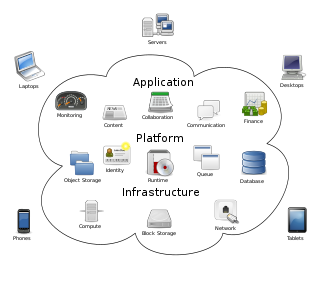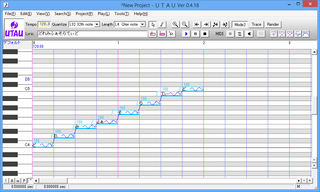
Yamaha Corporation is a Japanese musical instrument and audio equipment manufacturer.

Vocaloid is a singing voice synthesizer software product. Its signal processing part was developed through a joint research project led by Kenmochi Hideki at the Pompeu Fabra University in Barcelona, Spain, in 2000 and was not originally intended to be a full commercial project. Backed by the Yamaha Corporation, it developed the software into the commercial product "Vocaloid" that was released in 2004.
Software as a service is a software licensing and delivery model in which software is licensed on a subscription basis and is centrally hosted. SaaS is also known as on-demand software, web-based software, or web-hosted software.

Hatsune Miku, officially code-named CV01, is a Vocaloid software voicebank developed by Crypton Future Media and its official anthropomorphic mascot character, a 16-year-old girl with long, turquoise twintails. Miku's personification has been marketed as a virtual idol, and has performed at live virtual concerts onstage as an animated projection.

Cloud computing is the on-demand availability of computer system resources, especially data storage and computing power, without direct active management by the user. Large clouds often have functions distributed over multiple locations, each of which is a data center. Cloud computing relies on sharing of resources to achieve coherence and typically uses a pay-as-you-go model, which can help in reducing capital expenses but may also lead to unexpected operating expenses for users.
Crypton Future Media, Inc., or simply Crypton, is a Japanese media company based in Sapporo, Japan. It develops, imports, and sells products for music, such as sound generator software, sampling CDs and DVDs, and sound effect and background music libraries. The company also provides services of online shopping, online community, and mobile content.

UTAU is a Japanese singing synthesizer application created by Ameya/Ayame (飴屋/菖蒲). This program is similar to the VOCALOID software, with the difference being it is shareware instead of under a third party licensing.

Internet Co., Ltd. or Internet, is a software company based in Osaka, Japan. It is best known for the music sequencer Singer Song Writer and Niconico Movie Maker for Nico Nico Douga, a video sharing website. It also develops singing synthesizers using the Vocaloid 4 engine developed by Yamaha Corporation. In 2014, they were the second leading company in sound-related software in Japan, boasting a 14.0% share of the market.

PowerFX Systems AB, commonly referred to simply as PowerFX, is a small recording company, based in Stockholm, Sweden. The company has been producing music samples, loops and sound effects since 1995. They also developed singing synthesizers using the VOCALOID engine developed by Yamaha Corporation.
Vocaloid is a singing voice synthesizer and the first engine released in the Vocaloid series. It was succeeded by Vocaloid 2. This version was made to be able to sing both English and Japanese.

Vocaloid 2 is a singing voice synthesizer and the successor to the Vocaloid voice synthesizer application by Yamaha. Unlike the first engine, Vocaloid 2 based its output on vocal samples, rather than voice analysis. The synthesis engine and the user interface were completely revamped, with Japanese Vocaloids possessing a Japanese interface, as opposed to the previous version, which used English for both versions. It is noteworthy for introducing the popular character Hatsune Miku. It was succeeded by Vocaloid 3.

Vocaloid 3 is a singing voice synthesizer and successor to Vocaloid 2 in the Vocaloid series. This version of the software is a much more expansive version, containing many new features, three new languages and many more vocals than past software versions combined. It was succeeded by Vocaloid 4.

Megpoid is a Vocaloid by Internet Co., Ltd. Her voice is sampled by Megumi Nakajima. The mascot of the software is called Gumi . She is also sometimes called Megpoid GUMI, or GUMI Megpoid.

VY1 is a Japanese female vocal developed by Yamaha Corporation and distributed by Bplats, Inc. to act as a "standard" vocal for Vocaloid. It has the codename of "Mizki". It was originally released for the Vocaloid 2 engine.

VY2 is a Japanese masculine vocal developed by Yamaha Corporation and distributed by Bplats, Inc. to act as a "standard" vocal for Vocaloid. It has the codename of "Yūma". It was originally released for the Vocaloid 2 engine. The fan design "Roro" which is illustrated by song producer Manbou no Ane, is commonly used to represent VY2. VY2 also has a Falsetto Voicebank that allows users to make higher pitched songs with its voice. VY2's voice bank is often used with the VY1 voice bank.

ZOLA Project is a release package for the Vocaloid 3 software containing the voices of 3 male singers. "ZOLA" is an acronym for "Zenithal Operated Liaison Aggregation".

Cyber Diva is a female vocal released by Yamaha for Vocaloid 4. In March 2015 on Instagram, an entertainer named Jenny Shima claimed that she was the voice provider for CYBER DIVA. Mrs. Shima is an American singer, theater actress, and model.

Hiyama Kiyoteru (氷山キヨテル) is a masculine vocaloid character produced by AH-Software Co. Ltd and released originally for Vocaloid 2. His voice is provided by Japanese male singer Kiyoshi Hiyama.

Vocaloid 5 is a singing voice synthesizer and successor to Vocaloid 4 in the Vocaloid series. It was succeeded by Vocaloid 6.














